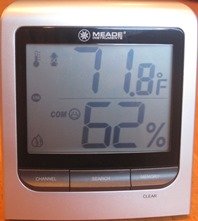Find a Mold Specialist Now
Click or Call, Toll-Free 24/7
Controlling House Humidity Levels
Some people never give a thought to house humidity but others, knowing that home humidity that is too high encourages the growth of mold that can be harmful too their health, want to monitor and control their humidity levels. Even if you are not concerned about mold, you will simply feel more comfortable with a mild to moderate amount of humidity in your house.
Measuring Home Humidity
Let’s talk for a moment about how humidity is measured. The amount of water vapor in a volume of air divided by the amount of dry air in that volume of air is known as absolute humidity. Hot air can contain more water vapor than cold air. Relative humidity is the ratio of absolute humidity to the highest possible amount of absolute humidity, determined by the temperature. If that sounds confusing or like too much math for you, don’t worry. There is a simple way to measure the humidity in your home.
An instrument called a hygrometer measures the relative humidity in a room. Many hygrometers show you the temperature in a room as well as the humidity. Relative humidity is expressed as a percentage. For example, to prevent mold growth in your home, you should keep the relative humidity below 50 percent. Experts say most people feel most comfortable with the home humidity just a bit lower, about 40 to 45 percent.
Problems Associated with Excessive House Humidity
Too much home humidity makes a house feel warmer than it really is, which can become uncomfortable. An excessively humid house often feels stuffy and has an unpleasant musty odor, as well. Mildew is common in the bathrooms of homes with excessive humidity.
One serious problem associated with excessive home humidity is the growth of mold. Recently we’ve seen a lot of information published about the health problems that can be caused by mold in the home. As you might imagine, health problems caused by mold include respiratory problems like asthma attacks, difficulty breathing, a runny nose, a cough and a sore throat. Health problems caused by mold go beyond respiratory problems, however, and include things like depression and fatigue.
Controlling House Humidity
There are a number of ways you can control the humidity in your home. Simply controlling the temperature in your house helps control the house humidity because warm air can hold more moisture than cool air. If you have an air conditioner for hot summer days, that will help keep the humidity from becoming excessive and causing problems. Air conditioning isn’t always enough to solve the problem, however. You can purchase dehumidifiers, appliances that pull moisture out of the air to reduce the humidity in a room, and many of them allow you to select the exact amount of relative humidity you want to maintain in the room. A hygrometer measures the amount of humidity in the air and then the dehumidifier turns off automatically when the desired level is reached and turns back on when the humidity begins to rise.
A good hygrometer can be the first step toward controlling the relative humidity in your home for optimum health and comfort. With a good hygrometer, you can track the humidity in your home over time. Some hygrometers even store readings in memory so you can easily review data to see how the humidity in your home increases or decreases over time.
Of course, in order for a hygrometer to help you control the humidity in your house, you need to have an accurate hygrometer. We’ve compared the features, cost and accuracy of several different hygrometers and selected a wireless hygrometer made by Ambient Weather as the best overall buy. To learn more about our Top Recommended Hygrometer, just follow this link.
Return From House Humidity To Our Best Hygrometer Page
Black Mold Health Symptoms Home Page





